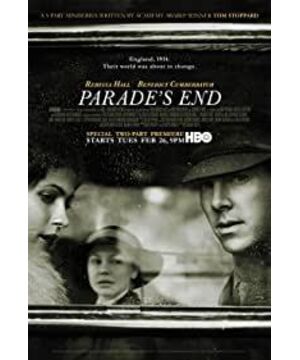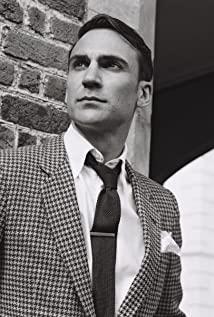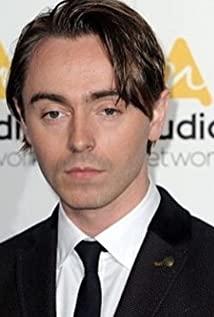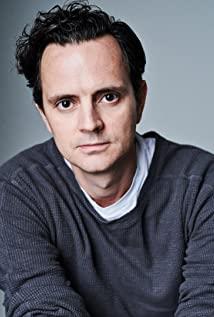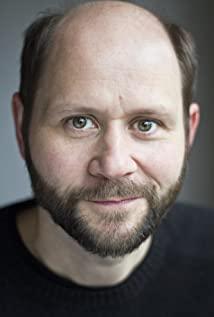Parade's End, for this title, literally translated as "the end of the queue" is not inappropriate, but after reading the whole play, I think the "Parade" here does not mean a queue. The word "Parade" appeared twice in the play. They were the boss of the actor Tiggins. The general asked Tiggins why he didn't divorce her after knowing the truth about Tiggins' wife Sevia's derailment. S replied: "There's something among families of position. Call It parade."
Parade here obviously does not mean queue. The subtitle group translates it into "honor", which I personally think is more similar to the ritual sequence in Chinese culture, meaning it is often just a show for outsiders. Judging from the plot, the Parade in the title Parade's End has exactly this meaning.
The second time Parade appears is at the end of the play. The officer said to the soldier: "There will be no more parades!"
Judging from the context at the time, Parade here refers to the military parade, but this is obviously a pun, and it is the finishing touch to the whole play. Gone are the old-time rituals that once adhered to.
What the whole play wants to express is how a man who is influenced by the old culture and deeply rooted in the alternation of the old and new eras slowly transforms and moves into the new era step by step.
Tiggins was born in a famous noble family, with excellent knowledge, high salary and important position, an authentic diamond king fifth. At the same time, he is conservative in thinking, abides by etiquette, and believes that marriage should end in the first place no matter what. So he meets the courtesan Sevia and insists on marrying her after a "carload of love", even though no one knows who the father of the child she is carrying is.
Wait, there is a contradiction here. On the one hand, he demanded himself in the spirit of the old-fashioned aristocracy, with a decent style and a gentleman everywhere. On the other hand, in the face of the temptation of women's lust, he actually lost all rationality, and he just jumped on it, and staged a car shock in an old-fashioned train in the early 20th century, which is even better than the current trendy men and women. Perhaps, this is his two sides. In his old-fashioned mind, there is a soul longing to be released. So, when Valentine, the young girl with short hair who was pursuing a new life, jumped in front of him without any scruples, his soul trembled uncontrollably. Isn't this kind of vitality and such freedom what his soul yearns for?
This is Tiggins' fate and his tragedy.
He wanted to use his personal ability to maintain the decaying order of the old world, and finally found himself unable to do anything in the constant frustration. However, in the face of the unknown new world, what can he do?
It can be seen at work. On the one hand, he is very confident in his own abilities and wants to make a difference to the society. On the other hand, he hates the government's hypocritical bureaucracy and is unwilling to follow the crowd, but he is powerless, and in the end he can only get rid of it completely.
Even more so in married life. To a certain extent, Tiggins' marriage to Sevia has the meaning of salvation. There is not much love, and he knows the origin of the other party, but he stubbornly married her, trying to use his own set of etiquette to maintain the family order of an old aristocrat. Even though he already knew that his wife betrayed him, when she ventured to confess, he still chose to forgive her at one point. However, it was at this time that his wife, like the rotten old world, completely let him down.
Sevia is actually a symbol of the old world. She was also born from a noble family. On the surface, she is a beautiful, gentle and charming lady, but she is a degenerate woman who is spiritually empty and takes pleasure in teasing men's feelings. Marriage was a tool for her to maintain her vanity, but the dull life after marriage could not make her stay in peace, and what made her more painful was that she could not make her husband revolve around her like other prey, while others revolved around her. The man made her boring again. Such a strange circle is like a hole she dug for herself. She wanted to jump and play, but it turned into a trap.
Does she love Tiggins? If it's love, it's better to say that there is no way to conquer her husband's heart, which makes her entangled. She worked tirelessly to try to visit Tiggins on the front line, and confided in front of him the loneliness and pain she had been waiting for for him. At that moment, Tiggins was finally moved, but at this emotional moment, her lover was knocking on the door outside, and she, seeing the two men getting angry for her, swept away love and love, and laughed excitedly Watching the good play directed by her in front of her. That's right, this is what she has pursued all her life, lest men in the world will not be chaotic and will be chaotic for her. At that moment, Tiggins completely saw Sevia's true face and fully understood his value in her mind. Their relationship has come to an end.
And his lover, Valentine, symbolizes the new world. Sevia once mocked her for being "like a boy scout". Indeed, she does not have the style and elegance of a traditional British lady, and she doesn't care about secular etiquette, and her pursuit of women's rights is ridiculous and disrespectful to conservative aristocrats. However, Tiggins found that her personality and knowledge, affection and waiting, were exactly the lover of her dreams.
It's ironic, Sevia, which seems to be the most aristocratic, is rotten inside. The so-called gold and jade are on the outside, and they are ruined; and the new woman Valentine, who seems to be deviant, actually has the excellent qualities of a traditional lady. . Ultimately, Tiggins chose the latter. It can be said that he used reason to maintain the ritual order of the old times, but after all, he could not resist the emotional pursuit of longing for love and freedom.
War is also a symbol here. It means the torment and test of body and mind, life and death in the process of transforming the old world into the new world. Tiggins could not have gone to the battlefield, but he insisted on joining the army, with the confusion of reality, trying to find his own answers in the raging war. The cruelty of this war, like his inner struggle, tore apart his body and soul. However, there is no change in an era that does not require violent turmoil; there is no transformation of thinking that does not require painful struggles. Without the ashes, how can you be reborn?
When the smoke cleared and everything was calm, he finally understood that those noble qualities that he thought the elites depended on for survival had long been forgotten, and the old world he had worked hard for was also on the wheels of the trend. slammed down.
With a tired body and relief after liberation, Tiggin accepted this fate and ushered in his new life. When he hugged Valentine and danced in his empty house, he had nothing to lose in fame and fortune, but he seemed to have everything, true love and true me.
This drama, on the surface, seems to be telling a cliché story about extramarital affairs and love triangles, but after watching the whole drama, you will find that the author wants to express far more than these. It was a process of a man groping hard and suffering painfully in the cracks of the changing times. Confusion, frustration, loss, pursuit, choice, all of these are well reflected through the male protagonist's emotional life. Yes, what better way to express a person's inner changes than the complex and secret emotional world?
The characters in the play are not as simple as the idiots in love. They have distinct personalities, each with the characteristics of the era, looking for their own position in that big era. What impresses people is Tiggins' good friend and his wife, who are well-dressed and chatting and laughing, behind the unknown filth and deeds. It was them who made Tiggins see more clearly how corrupt and hypocritical the high society was. In the end, the two friends who had been friends for many years were like strangers, nodding past the window, the other's dodging and Tiggins' calm, as if they were separated from each other.
�
View more about Parade's End reviews


